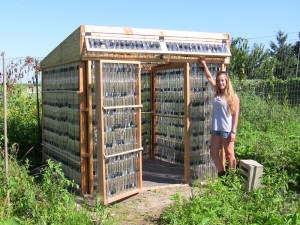

Aquafina. Dasani. Fiji. Evian. Absopure.
Plastic water bottles balance atop classroom desks and overflow campus trash bins.
“It always bothers me how so many people waste all these water bottles,” said Fabisiak, a University of Michigan-Dearborn graduate student.
Fabisiak browsed Pinterest in search of gardening tricks, but eventually stumbled upon a greenhouse constructed of plastic water bottles.
“I thought to myself, ‘I should try this,’” she said.
She landed a sustainability internship with UM-Dearborn’s Environmental Interpretive Center (EIC) and pitched the idea to Director David Susko.
Susko signed off on the project, which is just one of the many interesting capstone projects completed by EIC sustainability interns.
“The projects provide students with a unique opportunity to explore and research how they can make a measurable difference in our campus’ sustainability,” Susko said. “It also allows them to unleash their creativity and to think outside of the box when it comes to solving challenging environmental problems. I have been truly amazed by the vast array of ideas the sustainability interns have pursued.”
What proved most daunting was collecting the plastic water bottles. Fabisiak contacted several bottling companies, but didn’t strike gold until she contacted Absopure, which lent her nearly 1,300 misshapen plastic bottles.
Fellow sustainability intern Mike Karbon assisted Fabisiak with constructing the greenhouse, which stands seven feet and is located next to the EIC community gardens.
“So many little things could have gone wrong, so I definitely couldn’t have done it without Mike’s help,” she said.
Participants in the EIC gardening programs now can grow their own plants within the greenhouse, without fear of weather-related damage. The plastic water bottles allow sunlight through and also serve as good insulators to maintain adequate temperatures.
“I really like the fact that people see this and wonder what else they could make with water bottles,” said Fabisiak, who plans to graduate in 2015 with a master’s degree in environmental science. “I think it will raise awareness and creative thinking as to how recyclable materials can be used.”





